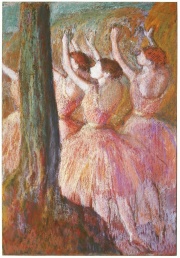Difference between revisions of "Pastel"
(username removed) |
(username removed) |
||
| Line 21: | Line 21: | ||
== Additional Information == | == Additional Information == | ||
| − | M.Shelley, "Pastel" in Media and Techniques of Works of Art on Paper, New York University Conservation Center of the Institute of Fine Arts, New York, 1999. | + | ° M.Shelley, "Pastel" in Media and Techniques of Works of Art on Paper, New York University Conservation Center of the Institute of Fine Arts, New York, 1999. ° G.Monnier, "Pastel", ''The Dictionary of Art'', Grove's Dictionaries Inc., New York, 1996. |
[[File:99.664.114-SC33419.jpg|thumb|'''MFA Acc. #:''' 99.664.114]] | [[File:99.664.114-SC33419.jpg|thumb|'''MFA Acc. #:''' 99.664.114]] | ||
| Line 46: | Line 46: | ||
== Authority == | == Authority == | ||
| − | * | + | * R. J. Gettens, G.L. Stout, ''Painting Materials, A Short Encyclopaedia'', Dover Publications, New York, 1966 Comment: p. 47 |
| − | * | + | * Reed Kay, ''The Painter's Guide To Studio Methods and Materials'', Prentice-Hall, Inc., Englewood Cliffs, NJ, 1983 |
| − | * | + | * Ralph Mayer, ''A Dictionary of Art Terms and Techniques'', Harper and Row Publishers, New York, 1969 (also 1945 printing) |
[[Category:Materials database]] | [[Category:Materials database]] | ||
Revision as of 07:44, 24 July 2013
Description
A soft, blendable, pigmented drawing stick. Pastel chalks or crayons were first documented by Da Vinci in 1495 with a reference to their use by Jean Perreal in France (Shelley 1999). They became very popular for portraiture in the mid-18th century and were revived in the late 19th century. Pastel crayons are made with a finely ground pigments mixed with a small amount of a water-based binder, such as gum tragacanth or, from the mid-20th century, methyl cellulose. Many pastels contain pure pigments producing intense, deep colors; lighter colors are diluted with an inert filler (chalk, gypsum, talc, kaolin, etc.). Pastels produce a powdery, easily smudged drawing. To minimize smudging, some pastels are 'fixed' or secured with an aerosol-sprayed, thin layer of varnish called a fixative. Fixatives, however, tend change the optical appearance of the pastels.
See also oil pastel.
Synonyms and Related Terms
pastels (pl.); pastel (Esp., Fr., Port.); colored chalk; French chalk; pastel crayon
Other Properties
Binder is water soluble.
Hazards and Safety
Some organic colorants used from the 19th c. on may not be lightfast.
Additional Information
° M.Shelley, "Pastel" in Media and Techniques of Works of Art on Paper, New York University Conservation Center of the Institute of Fine Arts, New York, 1999. ° G.Monnier, "Pastel", The Dictionary of Art, Grove's Dictionaries Inc., New York, 1996.
Comparisons
Websites of pastel, pencil and marker manufacturers
Websites of pastel, pencil, and marker manufacturers
Websites of pastel, pencil, and marker manufacturers
Additional Images
Authority
- R. J. Gettens, G.L. Stout, Painting Materials, A Short Encyclopaedia, Dover Publications, New York, 1966 Comment: p. 47
- Reed Kay, The Painter's Guide To Studio Methods and Materials, Prentice-Hall, Inc., Englewood Cliffs, NJ, 1983
- Ralph Mayer, A Dictionary of Art Terms and Techniques, Harper and Row Publishers, New York, 1969 (also 1945 printing)






